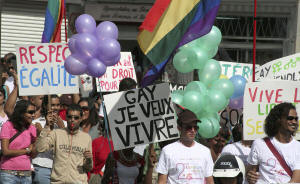Mauritius Supreme Court decriminalizes same-sex relations
 Send a link to a friend
Send a link to a friend
 [October 05, 2023]
By Villen Anganan [October 05, 2023]
By Villen Anganan
PORT-LOUIS (Reuters) - The Supreme Court of Mauritius has struck out a
colonial-era law criminalizing same-sex relations, bucking a trend seen
elsewhere in Africa where laws cracking down on LGBT rights have been
passed or proposed.
In a ruling on two cases brought by members of the gay community in the
Indian Ocean island nation, the court said section 250 of the Mauritian
criminal code, which dated back to 1898 during British colonial rule,
was unconstitutional.
"Section 250 was not introduced in Mauritius to reflect any indigenous
Mauritian values but was inherited as part of our colonial history from
Britain," the court said in a ruling handed down on Wednesday.
The government, the defendant in the cases, had said that while it was
sympathetic to the arguments put forward by LGBT citizens, the values of
wider society meant that the time was not right to change the law
through parliament.
But the Supreme Court said the old law "criminalizes the only natural
way for the plaintiffs and other homosexual men to have sexual
intercourse, whereas heterosexual men are permitted the right to have
sexual intercourse in a way which is natural to them".

UNAIDS, the United Nations agency in charge of combating the HIV/AIDS
pandemic, said the ruling was an important step forward for public
health and towards equal rights and respect for the LGBT community.
[to top of second column]
|

Members of the gay and lesbian community in Mauritius take part in a
march for gay rights and gender equality in the town of Rose Hill
June 2, 2007. REUTERS/Jean Alain Laportine/ File Photo

"UNAIDS applauds Mauritius for today’s decision, which will mean
that men who have sex with men will have much easier access to the
health and social services they need without fear of arrest or
criminalization," said Anne Githuku-Shongwe, a senior UNAIDS
official in the region. "It will save lives."
She added that work would need to continue to break down the
barriers of stigma and discrimination.
The Mauritian ruling stands in sharp contrast to developments
elsewhere in Africa, especially in Uganda where one of the world's
harshest anti-homosexuality laws was passed in May, imposing the
death penalty for some same-sex acts.
Despite Uganda being widely denounced for the law and having some of
its aid flows cut off, lawmakers in a number of other African
countries including Kenya, Tanzania and South Sudan are working to
bring in similar laws in their countries.
Those in favor of such laws say that same-sex relations are
unnatural and that Africans must resist what they see as the
imposition of Western values that threaten social order.
(Reporting by Villen Anganan; writing by Estelle Shirbon; editing by
Mark Heinrich)
[© 2023 Thomson Reuters. All rights
reserved.]This material
may not be published, broadcast, rewritten or redistributed.
Thompson Reuters is solely responsible for this content. |